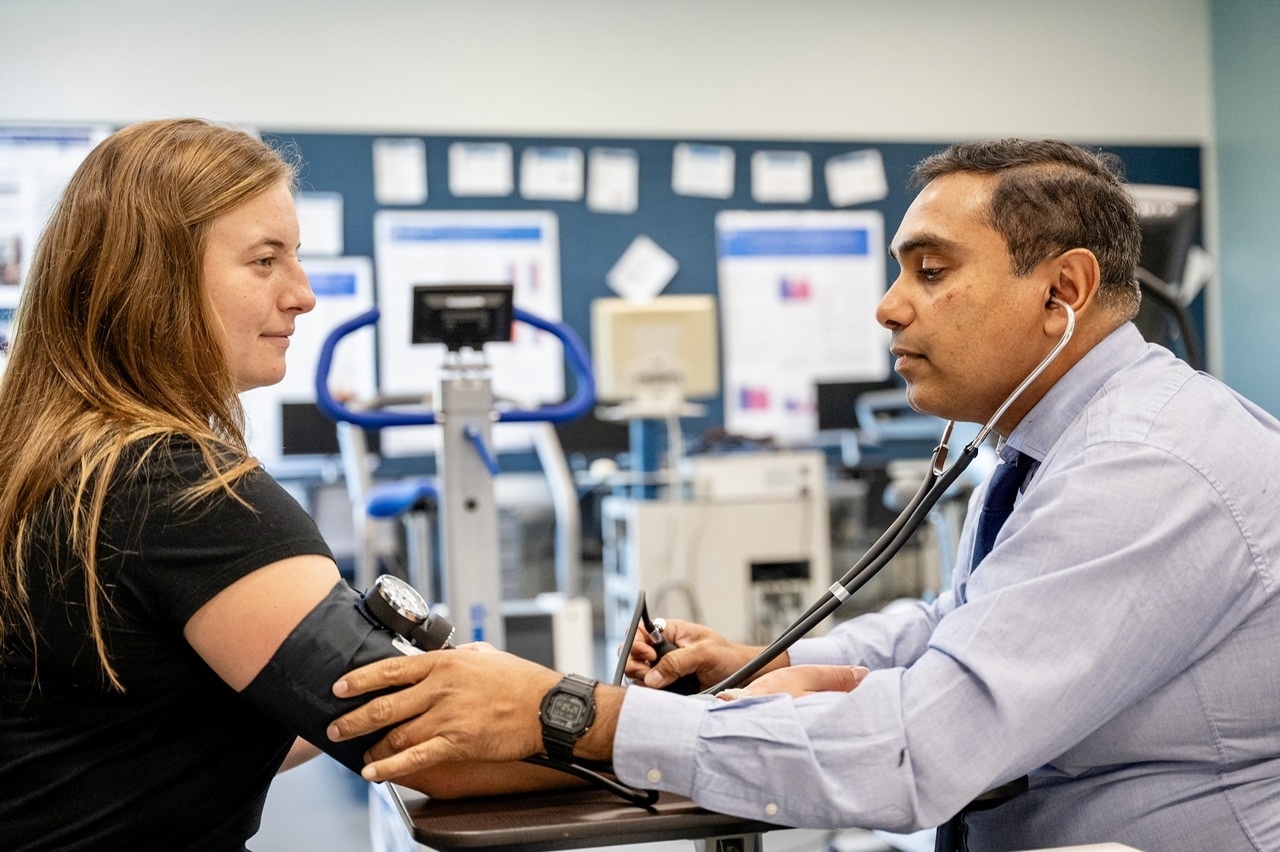Hypertension, a condition where blood pressure is persistently increased, is the leading cause of death worldwide, affecting more than 1.4 billion people and accounting for more than 28,000 deaths each day. While initially, it does not cause any symptoms, if left untreated it can lead to stroke, heart attack, kidney disease, vision loss and dementia. (Source: International Society of Hypertension)
Praveen Veerabhadrappa, associate professor of kinesiology at Penn State Berks, is on the frontline of the fight against hypertension. An expert in the field of cardiovascular exercise science, he joined a panel of 43 scientists from 18 countries convened by the International Society of Hypertension (ISH) College of Experts to publish important research about new directions in hypertension prevention, based on the latest clinical and scientific evidence.
The paper is titled “Lifestyle management of hypertension: International Society of Hypertension position paper endorsed by the World Hypertension League and European Society of Hypertension.”

Since its release in September 2023, the position paper has been widely published by such notable organizations as the “Journal of Hypertension” and the NIH National Library of Science, just to name a few. It has also been published by international media organizations including the BBC, Indian Express, and others. In addition, the ISH posted interviews with the panel of experts regarding the study on its YouTube channel.
The research indicates that new directions in prevention, in addition to more traditional methods, could be used as an effective first-line defense against hypertension. While physical exercise has been a traditional recommendation, Veerabhadrappa explained that isometric resistance exercise, which involves the static contraction of a muscle without any visible movement in the angle of the joint, also has a preventative effect, according to research.
Other lifestyle management recommendations from the paper show that stress reduction techniques such as listening to music, mindfulness practice, meditation and yoga should be recommended to people with high blood pressure. People should also be advised to get quality sleep and reduce their exposure to air pollution. The paper highlights these strategies alongside long-standing recommendations to maintain a healthy weight, exercise regularly, minimize sedentary behavior, eat a healthy diet, reduce consumption of salt, stop smoking and limit (or stop) alcohol consumption.
“Developing these daily health habits is a holistic approach to high blood pressure prevention for people across the globe,” said Veerabhadrappa.
When asked why he pursued this field of research, he explained that he is motivated by family members who suffer from hypertension, including his father and grandparents. As a young adult growing up in India, he would often accompany his grandparents to the physician for the condition.
Veerabhadrappa earned both his M.S. and Ph.D. in exercise physiology at Temple University, and he has dedicated his professional life to finding ways to help people live longer, healthier lives through exercise.
“It has always been my dream to frame health guidelines for physicians in the fight against hypertension,” Veerabhadrappa added. “My family is proud of me as these guidelines have a potential for a global impact in our battle against high blood pressure.”
At Penn State Berks, Veerabhadrappa, affectionately known as “Dr. V.” to his students, has supervised several undergraduate research projects. He is passionate about research, innovation and inspiring the next generation of student leaders to further scientific investigation.
His current research focuses on incorporating ambulatory blood pressure monitoring (ABPM) to gauge a subject’s blood pressure for a 24-hour period. He calls this ‘real-world blood pressure’ and explains this technique is used widely in Europe. His student research group works in the college’s cardiovascular exercise physiology lab to study the cardio-metabolic effects of sedentary behavior using novel devices such as Actigraph, Fitbit, Vibralite and Apple Watch.
“Our research has used wearables to track activity and sleep among college students at Berks campus. We have seen that the majority of college students don’t tend to meet the physical activity guidelines set by American College of Sports Medicine. College students could also improve on the quality of sleep,” stated Veerabhadrappa.
“We are also noticing that the inactivity levels, inadequate sleep and mental health issues have compounded after the recent global pandemic.”
Many of Veerabhadrappa’s students are recipients of Penn State Erickson Discovery Grants. His student researchers have been included as authors on several of his publications, and have presented their work at local, regional and national professional conferences. Several have gone on to pursue careers in the medical field after graduation.
Veerabhadrappa is a Fellow of the ISH. Election as a Fellow recognizes and honors members who have distinguished themselves through excellence in clinical practice or research in the field of hypertension. The criteria for fellowship are outstanding contributions to hypertension research, demonstration of national and international service, consistent scholarly production, and a history of mentoring.
In addition, Veerabhadrappa is the founding member of the New Investigator Network of The International Society of Hypertension. His research is recognized internationally with several awards and he is part of the editorial board and a peer-reviewer for many high-impact journals in science and medicine. For a complete list of his publications, visit his profile on Google Scholar.
To learn more about this study, visit the ISHBP on Twitter: @ISHBP and @JHypertension. For more information on Veerabhadrappa’s research, contact pmv5057@psu.edu.


